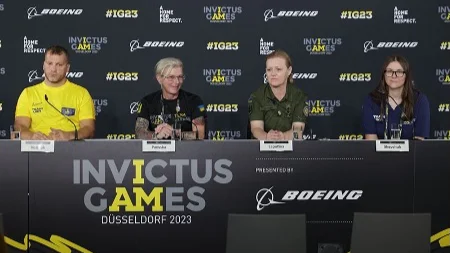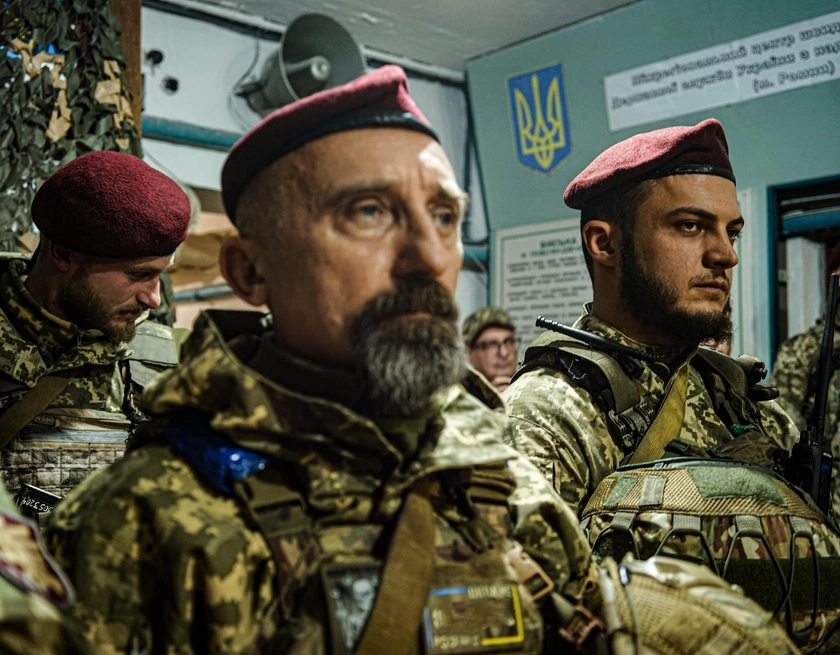Ukrainian athletes were moved close to tears by the emotional reception they received at the opening of the international games for wounded service personnel.
The sixth Invictus Games, which is being held in Düsseldorf, Germany from Sept. 9 to 16, will see 600 athletes from 22 countries, including 25 from Ukraine, taking part in 10 separate sports.
JOIN US ON TELEGRAM
Follow our coverage of the war on the @Kyivpost_official.
These are: Track Athletics, Field Athletics, Indoor Rowing, Power Lifting, Sitting Volleyball, Swimming, Cycling, Wheelchair Basketball, Wheelchair Rugby and Table Tennis.
- Get the freshest Ukraine news updates as of today.
- Read the most current Ukraine news stories for today.
The games were launched in 2014 at the initiative of the UK's Prince Harry, the Duke of Sussex. Ukraine has sent teams since the third event in 2017, the current Games is their fourth.
The Ukrainian delegation to the games, led by the Ukrainian Minister for Veterans, Yulia Laputina, held a press conference on Saturday in which they saw a remarkable outpouring of support.
There was a standing ovation even before the minister or the other Ukrainian participants Yuliia “Taira” Paevka, Julia Shevchuk and Nazar Vozniuk spoke. All three seemed a little taken aback by the reception they received.

Ukraine’s Invictus Games press conference team
L to R: Nazar Vozniuk, Yuliia Paevka, Yulia Laputina, Julia Shevchuk
Photo: Invictus Games
Laputina seemed close to tears when she conveyed Ukraine’s gratitude for the support her country was receiving and those who had made it possible for Ukraine’s athletes to attend.

Ukrainian PM Says US Military Aid to Ukraine Continues Despite Contrary Reports
She went on to say “However, it is difficult for us to be here while our sons, daughters, fathers and brothers are on the front line defending the country’s freedom.”
She said she was confident that Ukraine can claim victory “not only militarily, but also mentally” which is what the games stand for.
She asked for a minute’s silence for Ukraine’s fallen soldiers – a request that saw the audience rise.
Yuliia Paevska, known by her battle name “Taira,” is a Ukrainian paramedic who was captured, held, and tortured in Russia for three months.
She said she is adamant that, despite the enormous pain she’s suffered, she remains unbroken and that the spirit of the games gives her hope, strength and confidence.
Julia Shevchuk was training to be a scientist before enlisting in Ukraine’s medical services. She expressed her motivation for participating in the games.
“Nothing holds us back, we are unstoppable. We tear down walls, barriers give us wings... that is the spirit with which we will win [the war], and that is also Invictus Games.”
Nazar Vozniuk was a lawyer who volunteered to serve and was enlisted as a soldier. He said he had been overwhelmed by the waves of support he has seen in the German city.
He said Ukrainian flags are everywhere on the streets, in the windows, on trams and at the games’ venue, the Merkur Spiel-Arena.
He said the games makes him stronger and helps give him hope for a normal life after the war.
Ukraine’s results so far
At close of play on Monday, Sept. 11 the second day of competition, Ukraine had won 10 medals:
Sunday Sept: 10
· Gold - Oleksandr Makovei, IF8 shot put
· Silver - Volodymyr Hera, IF7 shot put
· Silver - Mykola Zaritskyi, IF1 discus
· Silver - Maksym Zubov, IP6 powerlifting
· Bronze - Vadym Maznichenko, IF6 shot put
· Bronze - Volodymyr Tovkys, IF2 discus
Yulia Paievska came 12th place in the IP3-IP5 powerlifting.
The Ukrainian wheelchair rugby team defeated Italy, lost to Great Britain and still has a match against France to play.
Monday Sept. 11
· Gold - Mykola Zaritsky, IF1 shot put
· Silver - Volodymyr Hera, IF7 discus
· Silver - Maksym Dmytrash, IJ5 long jump
· Bronze - Vitaly Borodavka, IT7 100 meters
How are athletes classified?
The classification or categorization of the severity of any injury suffered by the athlete is a complex process with the handbook for the Invictus Games running to 55 pages.
The purpose of the categorization system is to promote participation in sport by minimizing the impact of impairments on the outcome of competition.
The system used is described as a “functional system” – this means that the main factors that determine category are not a diagnosis and medical evaluation, but how much the impairment of a person impacts their performance.
The functional system is sports-specific, as an injury impairment may have a significant impact on one sport but be relatively minor in another.
The Invictus handbook gives the example that the impact of bilateral below-elbow amputation would have on swimming would be relatively large compared with the impact it would have on distance running.
Event program
The seven days of competition are summarized at:
https://invictusgames23.de/media/games_schedule_ig23_v2_as_at_june_2023.pdf
The Ukrainian team at the opening ceremony
You can also highlight the text and press Ctrl + Enter












